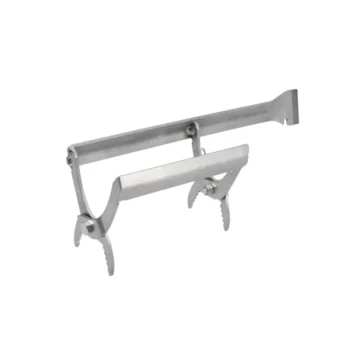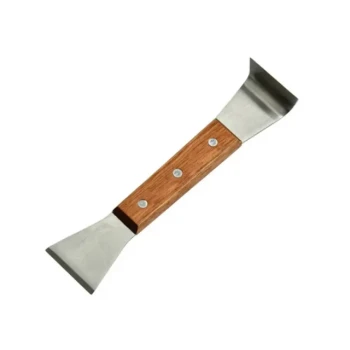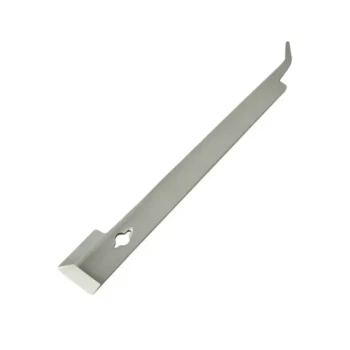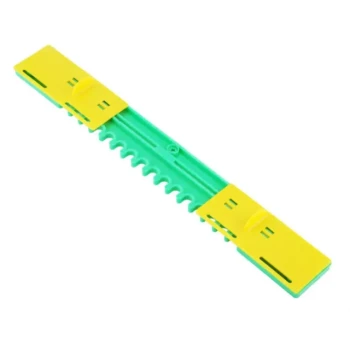At their core, nucleus colonies, or "nucs," are the single most effective tool for expanding a beekeeping operation. They allow you to move beyond simply buying bees and become a producer of your own colonies, creating new, healthy hives quickly and far more inexpensively than purchasing them from other suppliers.
The strategic use of nucs transforms your role from a bee-haver to a bee-breeder. This shift is the fundamental principle behind creating a scalable, resilient, and economically sound apiary.
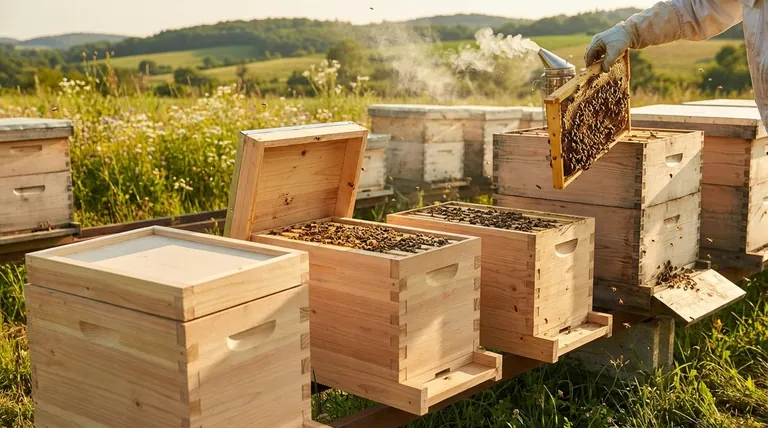
The Core Mechanism: Making Splits for Growth
The most direct way nucs facilitate expansion is by enabling you to "split" your strong, existing colonies. This is the process of creating two or more colonies from one.
From Nuc to Full-Sized Hive
The mechanics are straightforward. You take a few frames of brood, honey, and pollen—along with the accompanying nurse bees—from a strong "donor" hive and place them into a nuc box.
You then introduce a new queen or a queen cell to this nuc. Once the new queen is accepted and laying, the nuc is a self-sustaining colony in miniature. It can then be transferred into a full-sized hive body to grow into a production colony.
The Economic Advantage
Making your own splits offers a significant financial benefit. Purchasing packages or established colonies is a major capital expense for a growing operation.
By using your own bees to create nucs, you can save hundreds or even thousands of dollars, turning your strongest colonies into a renewable resource for expansion.
Nucs as a Strategic Apiary Management Tool
Beyond simply making more hives, nucs are indispensable for the overall health and productivity of your entire operation, which is critical for sustainable growth.
Alleviating Swarm Tendencies
Overly crowded colonies are prone to swarming, which means you lose half your workforce and a productive queen.
By making a timely split from a populous colony, you relieve this congestion, prevent the swarm, and get a new colony in the process. This keeps your production hives strong and focused on their primary task.
Solving Untimely Queen Problems
A hive that unexpectedly loses its queen can collapse quickly. Maintaining a "bank" of nucs with mated, laying queens is your insurance policy.
Instead of waiting weeks to order a new queen or for the colony to raise its own, you can immediately unite a queen-right nuc with the queenless hive, saving the colony and minimizing production downtime.
Strengthening Weak Colonies
Not every colony performs at the same level. A weak but otherwise healthy colony can be bolstered by adding a frame of capped brood from a strong nuc.
This infusion of new bees helps the weaker colony rebound much faster than it could on its own, ensuring more of your hives reach production strength.
Creating a New Revenue Stream
Once your operation is proficient at making nucs for its own expansion, you can begin producing them for sale. High-quality, locally adapted nucs are always in demand and can add a valuable and profitable enterprise to your beekeeping business.
Understanding the Trade-offs
While powerful, using nucs for expansion is a strategic decision with clear consequences that must be managed.
The Impact on Productivity
The most significant trade-off is the temporary reduction in honey production. A heavily split production colony will have its population set back.
It will need time to rebuild its workforce before it can produce a surplus honey crop. You must balance your goals for expansion against your goals for honey yield in any given season.
Equipment Standardization
For efficiency, it's wise to use standard equipment. Five-frame nucs are often preferred because they are compatible with standard deep or medium frames.
This allows for easy interchangeability of frames, queen excluders, and even small supers between your nucs and your full-sized hives, streamlining your workflow.
How to Apply This to Your Operation
Your approach to using nucs should align directly with your primary business objective.
- If your primary focus is rapid expansion: Make splits aggressively from your strongest colonies as soon as they have the bee population to spare.
- If your primary focus is maximizing honey production: Make splits very early in the season or only from colonies not designated for honey production to minimize impact.
- If your primary focus is apiary resilience: Maintain several nucs throughout the season primarily as a resource for requeening and bolstering weaker hives as needed.
Integrating nucleus colonies into your workflow is the defining step in taking professional control over your apiary's growth and long-term success.
Summary Table:
| Nuc Application | Key Benefit |
|---|---|
| Making Splits | Cost-effective colony creation from strong hives |
| Swarm Prevention | Reduces congestion and retains workforce |
| Queen Replacement | Immediate solution for queenless hives |
| Strengthening Hives | Boosts weak colonies with brood frames |
| Revenue Generation | Creates sellable nucs as a new income stream |
Ready to scale your beekeeping operation with professional-grade equipment? HONESTBEE supplies commercial apiaries and beekeeping equipment distributors with the durable, standardized nuc boxes and hive components needed to implement these expansion strategies efficiently. Let our wholesale-focused expertise help you build a more resilient and profitable apiary. Contact our team today to discuss your equipment needs and volume pricing.
Visual Guide
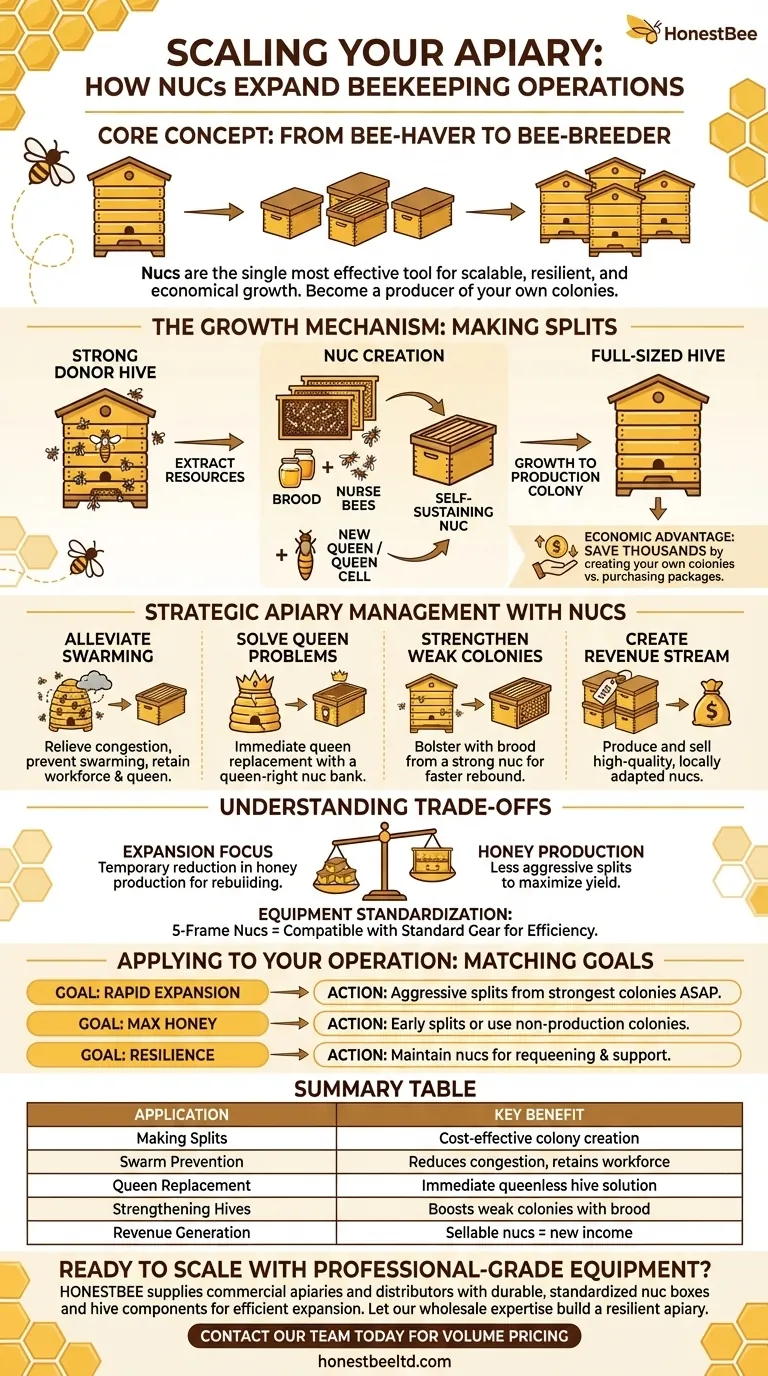
Related Products
- 5 Frame Wooden Nuc Box for Beekeeping
- Plastic Transporting Bee Packages and Nuc Boxes for Beekeeping
- 5 Frame Langstroth Poly Nuc Corrugated Plastic Nuc Boxes
- Portable Bee Mating Hive Boxes Mini Mating Nucs 8 Frames for Queen Rearing
- HONESTBEE Professional Long Handled Hive Tool with Precision Cutting Blade
People Also Ask
- What are the benefits of moving nuclei around the apiary? Master Strategic Hive Management
- What feeding feature is common in 5-frame nuc boxes? Explore Top-Feeding Innovation for Colony Growth
- How many frames does a typical wooden nuc box hold? A Guide to Choosing the Right Size
- What are the benefits of starting a new bee colony in a nuc box? Boost Colony Success with Efficient Beekeeping
- When can nucleus colonies (nucs) be created? Optimal Timing for Apiary Growth and Survival








